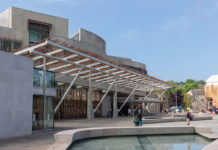Extending trading times by a couple of hours could help save businesses and jobs, new economic impact study says
MINOR changes to trading restrictions under the Scottish Government’s coronavirus levels system could more than double the economic viability of Scotland’s hospitality businesses, and help secure the future of 1800 businesses and 32,500 jobs, according to a new study.
The independent economic impact study by BiGGAR Economics, which was commissioned by Diageo, found that adjusting trading times by around two and a half hours and allowing alcohol to be served while maintaining COVID-19 safety measures would increase hospitality business turnover from £419 million to £1.1 billion; increase the number of jobs supported from the current 28,300 to 60,800; and secure the viability of 1,816 businesses. The changes to restrictions would also impact on public finances, turning a £261m fiscal cost of subsidy into a £63m tax contribution, the study says.
The report considered the economic impact of five scenarios, including the restrictions in place before 11th December, restrictions currently in place, and three potential alternative scenarios, each of which maintain safety measures but allow for longer opening hours and alcohol to be served across levels one to three of the Scottish Government’s restrictions. The three alternatives considered were: extending closing times from 8pm to 10.30pm and allowing alcohol to be served with food in levels one to three – a scenario the study said supports £927m in turnover and 53,100 jobs and represents a fiscal cost of £14m; also allowing wet-led pubs and bars that don’t serve food to open until 8pm in levels one to three – a change it says supports £1.1bn in turnover, 60,800 jobs and a fiscal benefit of £63m; and allowing all hospitality businesses to open until 10.30pm and to serve alcohol – a move the report says supports £1.2bn in turnover, 65,400 jobs, and a fiscal benefit of £105m.
First minister Nicola Sturgeon is set to announce the weekly review of local authority coronavirus restrictions levels in the Scottish Parliament this afternoon.
Trade groups the Scottish Beer & Pub Association (SBPA), Scottish Licensed Trade Association (SLTA) and UK Hospitality Scotland (UKH Scotland) are calling on the Scottish Government to “urgently implement the changes to save businesses and jobs”.
SBPA chief executive Emma McClarkin said: “Public health remains the paramount concern and hospitality businesses have proven they can operate safely with comprehensive COVID-19 measures in place.
“This economic impact study shows that relatively minor changes to opening hours and allowing businesses to serve alcohol responsibly would transform the commercial viability of the sector.”
Colin Wilkinson, managing director of the SLTA, said “This would create a more sustainable environment for hospitality businesses beyond Christmas and ensure more of them survive the winter, continue to create jobs and play the positive role as part of the fabric of communities the length and breadth of Scotland.”
And director of UK Hospitality Scotland, Wille MacLeod, said adjusting restrictions “would give our sector a transformative boost and help support business in the crucial recovery period”.
Graeme Blackett of BiGGAR Economics said the study highlights the “severe negative economic impact that COVID-19 restrictions have had on the hospitality sector, the businesses and people who work in the sector itself, and the businesses and employees in the supply chain”.
“It also demonstrates that scenarios which allow for extended trading, whilst maintaining appropriate safety restrictions, can place the hospitality sector and the wider food and drink supply chain in a much stronger position,” he said.
“Minor adjustments to the restrictions could get thousands of people back to work and allow the sector to generate turnover and contribute significantly to the public finances in 2021.”
























